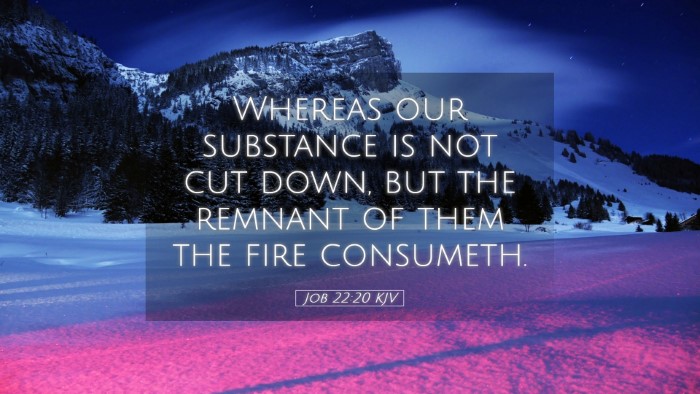Old Testament
Genesis Exodus Leviticus Numbers Deuteronomy Joshua Judges Ruth 1 Samuel 2 Samuel 1 Kings 2 Kings 1 Chronicles 2 Chronicles Ezra Nehemiah Esther Job Psalms Proverbs Ecclesiastes Song of Solomon Isaiah Jeremiah Lamentations Ezekiel Daniel Hosea Joel Amos Obadiah Jonah Micah Nahum Habakkuk Zephaniah Haggai Zechariah MalachiJob 22:20
Job 22:20 KJV
Whereas our substance is not cut down, but the remnant of them the fire consumeth.
Job 22:20 Bible Commentary
Commentary on Job 22:20
Verse Reference: Job 22:20 - "They say, 'What is the good of this?'"
Introduction
Job 22:20 serves as a pivotal moment in the dialogue between Job and his friends, encapsulating the tensions of human suffering and the perceived justice of God. It reflects the mindset of those who believe in a strict retributive justice while also revealing the limitations of their understanding of divine providence.
Overview of the Context
This verse is part of Eliphaz's third speech, where he critiques Job's integrity and challenges his claims of innocence. The assertion, "They say, 'What is the good of this?'" can be seen as reflective of the wider sentiments of character witnesses against Job, suggesting a deep skepticism towards his righteousness and a presumption of unworthiness in his suffering.
Insights from Matthew Henry
Matthew Henry provides a comprehensive examination of this text, focusing on the theological implications of Eliphaz's arguments. He notes:
- Nature of Human Judgment: Henry emphasizes that the presumptions made by the friends of Job stem from a misunderstanding of God's ways. They see Job's calamities as a reflection of his unrighteousness.
- Righteousness and Retribution: He argues that Eliphaz reflects a common theological error—believing that suffering is always the result of sin. This shortsightedness illustrates a lack of understanding regarding the complexities of providence.
- Challenge to Integrity: Henry highlights that Eliphaz's words challenge the integrity of Job, urging that no good can come from his plight. This notion leads to a greater exploration of what constitutes true faith amidst adversity.
Insights from Albert Barnes
Albert Barnes echoes many of Henry's sentiments, focusing on the broader implications of Eliphaz's perspective on suffering and justice:
- Philosophy of Retribution: Barnes elaborates on the principle of strict retribution that Eliphaz advocates, arguing that he falls into the trap of applying a one-size-fits-all theology to Job’s situation. He points out that not all suffering is punitive.
- Theological Misstep: According to Barnes, Eliphaz's statement reveals a theological misstep; he implies that if Job were truly righteous, God would not allow him to suffer. This belief overlooks the suffering of the innocent and the prosperity of the wicked.
- Dangers of Misjudgment: Barnes reminds readers that misjudging another's situation can lead to severe errors in pastoral care, urging caution in making swift conclusions about divine judgment based on observable evidence.
Insights from Adam Clarke
Adam Clarke offers a nuanced interpretation that highlights the psychological and emotional dimensions of Job’s experience:
- The Impact of Words: Clarke points out the devastating impact of Eliphaz's accusations on Job's spirit. Words can cause profound distress, and in this instance, they serve to exacerbate Job's already intense suffering.
- Understanding of Divine Justice: He urges an understanding of divine justice that acknowledges the mystery of suffering. Clarke argues that human beings often err in assuming we can fully grasp God’s plans and purposes.
- Call to Compassion: Clarke emphasizes the need for compassion and empathy, encouraging those in ministry to approach suffering individuals with grace rather than judgment. This represents a pastoral approach that mirrors the compassion of Christ.
Exegetical Analysis
Examining the Hebrew terms and syntax used in Job 22:20 can yield deeper insights:
- Hebrew Context: The phrase reflects a common legalistic mindset where actions are correlated with direct outcomes. The underlying Hebrew suggests not merely a question of good but challenges the value of Job’s life and righteousness.
- Consequences of Error: The verse invokes a sense of fatalism, leading to the belief that faith and righteousness are futile in the face of suffering—a dangerous theological stance that can erode faith.
Theological Implications
This passage brings forth several critical theological implications surrounding the nature of God, human suffering, and justice:
- God's Sovereignty vs. Human Understanding: Job 22:20 highlights the tension between divine sovereignty and human understanding. It encourages a reflection on how we perceive and interpret suffering within our own lives.
- Faith Amidst Suffering: The text calls believers to maintain faith and integrity even in the midst of suffering that may seem unjust. It encourages a broader understanding that defies simplistic interpretations of God’s justice.
- The Role of Community: The passage also suggests that the community of faith can sometimes misrepresent God, emphasizing the need for wisdom and discernment in spiritual discourse.
Conclusion
In summary, Job 22:20 serves as a rich text for contemplation regarding suffering, integrity, and the complexities of God's justice. Insights from public domain commentaries illuminate the different facets of the conversation surrounding Job’s affliction and the misinterpretations of his friends. For pastors, students, theologians, and scholars, this verse challenges both our understanding of divine providence and our approach to pastoral care, urging us to embody compassion rather than judgment in the face of suffering.


